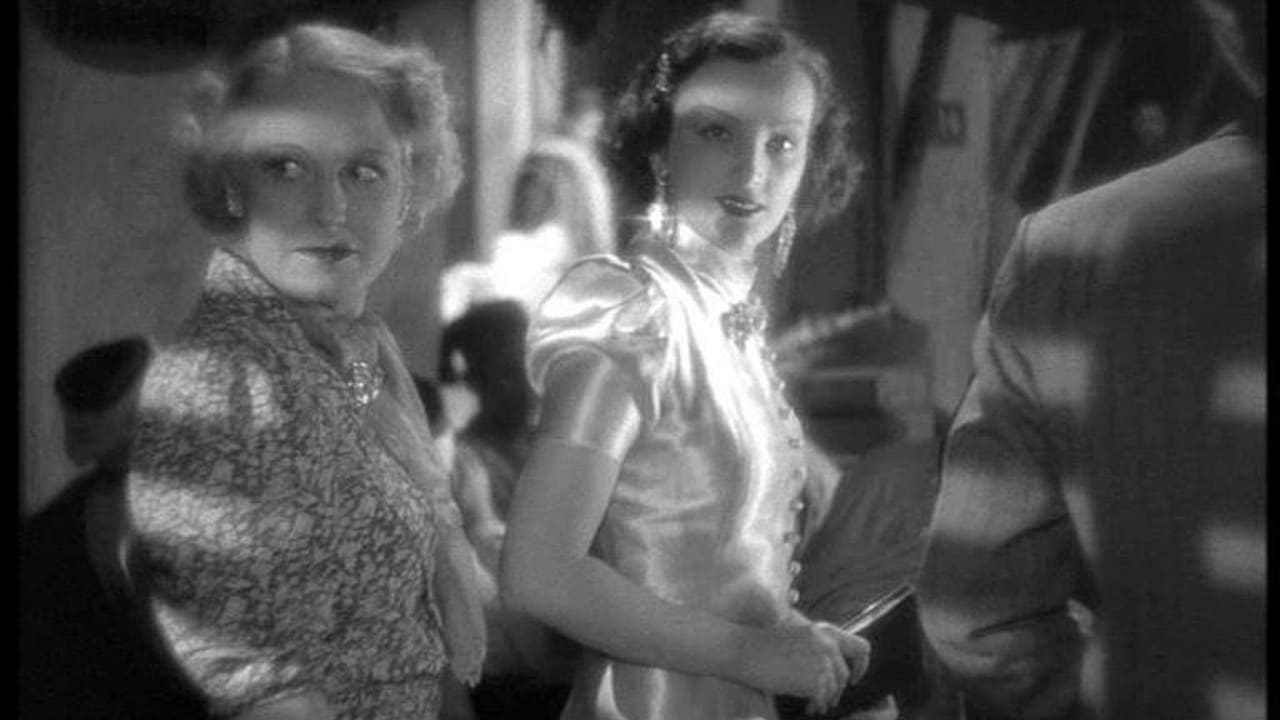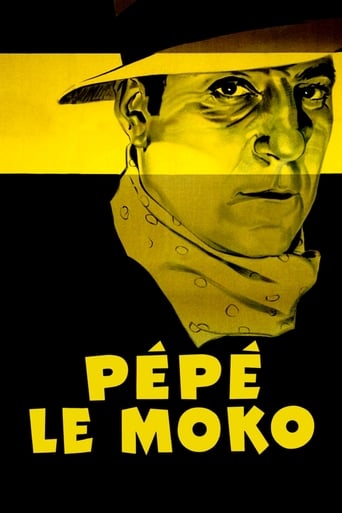

One of the significances of Julien Duvivier's "Pepe le Moko" is that Charles Boyer's character from the American remake inspired Pepe Le Pew. But there is definitely more to understand about the movie than that.An important point about this tale of a French gangster (Jean Gabin) hiding from the police in the Algiers casbah, is its status as a pivot. Gangster flicks had become a staple of American cinema in the 1930s, and so France made this film in response. But then this movie influenced film noir. It may have been the original film noir. Also noteworthy is the role of Europe's view of its colonies. Most popular media promoted stereotypical - usually negative - images of non-white peoples. Early in this movie, they note that the casbah is the home of several different ethnic groups (yet they don't mention Arabs). While the movie doesn't necessarily say anything positive about non-white peoples, it doesn't attack them.No matter what the movie says specifically about any group, it remains a formidable piece of cinema history, with its use of poetic realism. The labyrinthine streets of the casbah are like a character on their own. I definitely recommend it. Also starring Line Noro and Mireille Balin.
... View MorePepe le Moko (Jean Gabin) is something of a celebrity in the Algerian Casbah he calls home. The locals do what they can to protect Pepe and keep the police off his trail in hopes of winning his favor. But how long can Pepe remain hidden in the maze-like Casbah? The French police have a plan to use one of his best friends to lure Pepe out of the Casbah and place him under arrest. Complicating matters is a Parisian woman visiting Algiers that Pepe finds himself smitten with. She's different from what he's come to know in Algeria. She makes him dream and long for days of freedom outside the Casbah walls.To begin with, to anyone who recommended Pepe le Moko a big fat thanks. It's a great movie that I probably would have never even heard of had it not been for some of the good people at IMDb. As a budding fan of film noir, I was hooked from the minute the movie began. The plot kept my interest throughout. Never did it seem slow. I've only seen Jean Gabin in one other movie (Touchez pas au grisbi), but I'm quickly discovering what a talented actor he was. His Pepe is a very believable character. He plays Pepe with style, feeling, and, when called for, viciousness. Director Julien Duvivier uses the twisted roads and alleyways of the Casbah to create a one of kind setting for his film. I've actually been in a place like this during a visit to Tangiers, and the Casbah in Pepe le Moko gave me that same feeling of a place you would easily get lost in.In many ways, Pepe le Moko is ahead of its time. First, I honestly had no idea that something so seemingly American as film noir could be traced to 1930s French cinema. Many of the American films of the next two decades can surely be traced to Pepe le Moko. Second, much of the subject matter in the film is certainly something an American movie of the 30s would never touch or discuss so openly. Themes of sex and adultery wouldn't be commonplace in American cinema for years to come. And finally, some of the film techniques used by Duvivier give the film the look of something made years later. The camera has a fluidity and style I don't associate with the 30s when so much of what was being made still relied on the old "plant and shoot" technique of the silent era.
... View More"Pepe Le Moko" (1937) directed by Julien Duvivier - is a wonderful movie with the great performance from very young Jean Gabin. It just happened that I've seen several movies with him in the older age where he is serious, not very talkative man with the head full of grey hair and I like him in the later movies, too but it was so much fun to see him as Pepe - young, charming, dangerous, smart, brutal, irresistible, and so much in love with Paris that he'd lost forever. As much as I enjoyed the film as an early noir and crime, I think it is about the longing for home, about the nostalgia and as such it is even more interesting, deeper, poignant that just a noir. The celebrated film director Max Ophüls, who knew a lot about nostalgia and immigration said about Paris, "It offered the shining wet boulevards under the street lights, breakfast in Monmartre with cognac in your glass, coffee and lukewarm brioche, gigolos and prostitutes at night. Everyone in the world has two fatherlands: his own and Paris." I could not help thinking of his words when I watched the film. There is one scene that almost reduced me to tears - a middle-aged former chanteuse plays one of her records on a gramophone and sings along with her voice that has not changed at all even if she looks nothing like the picture on the wall from the days of her youth. The time may play very nasty jokes with a woman - she may get fat or skinny, lose her teeth and hair but her voice will stay as strong or tender, ringing or melodious as it was in the long gone days that stay forever in her memory. She sings about Paris and there are tears on her eyes and the scene simply can't leave any viewer indifferent. There is another scene - between Pepe and Gaby the girl from Paris with whom Pepe falls in love (Mireille Balin). They talk about Paris remembering different places which are dear to both of them, and in the end, they both named La Place Blanche where they both belong and not in Algiers's Casbah where Pepe is safe and he rules the world of criminals but can't forget the sound of Metro in Paris. When Pepe wants to tell Gaby that he loves her, he tells her that she reminds him of Metro in Paris... I have not even mentioned how masterfully the film was shot by Julien Duvivier and how well it was acted, how fast it movies, and there are so many wonderful scenes that I have not mentioned...Great, great movie.
... View MoreA gang of thieves hide out above Algiers in the Arab section of the city, the Casbah, in "Pepe le Moko," a 1937 film - an homage to the U.S. gangster movie - that is often credited as the inspiration for the film noir craze that swept U.S. cinema. In order to draw attention to the American version, "Algiers," producer Walter Wanger tried to destroy all copies, subsequently buying the rights to keep it off the screen. But you can't keep a good movie down.Pepe le Moko (Jean Gabin) is wanted by the police, so if he leaves the crowded and maze-like Casbah to go into town, they will nail him. There is an inspector who keeps an eye on Pepe, Inspector Slimane. Pepe and the inspector have become friends, but Pepe knows Slimane is just waiting for him to make his move. When Pepe meets the exotic and bejeweled Gaby, a situation presents itself where he might risk his freedom.Pepe is the great French actor Jean Gabin, a marvelous-looking, rugged actor with tremendous magnetism. It's no wonder Marlene Dietrich chased him all over the world. Gabin's Pepe is the forerunner of the Bogart persona - he's a confident, handsome man, dismissive of women and has the ability to be both funny and cruel. He lives with his devoted girlfriend, Ines, and is surrounded by his motley mob who are familiar with the seedier side of life.There are some brilliant moments and great performances in this film, which is rich in atmosphere and interesting faces. The French star Mireille Balin, whose real-life story is more bizarre than any fiction, is Gaby, a kept woman who enchants le Moko as they talk about their great love for Paris, most especially, Place Blanche. Line Noro is Ines, doomed to love and lose Pepe, and Frehel is Tania, a friend. In one of the best scenes in the film, Tania reminisces about her youth and sings along with her own recording. A wonderful artist. The entire cast is marvelous. The director, Julien Duvivier, orchestrates the proceedings with tremendous style and tension, capturing the heat, the light and the sounds of the Casbah.Often imitated - by "The Third Man," "Odd Man Out," "Casablanca," "The Time Of Your Life," "To Have And Have Not," "The Wages of Fear," -- and let's not forget Pepe le Pew - "Pepe le Moko" and Jean Gabin's Pepe stand on their own as hallmarks in film history.
... View More